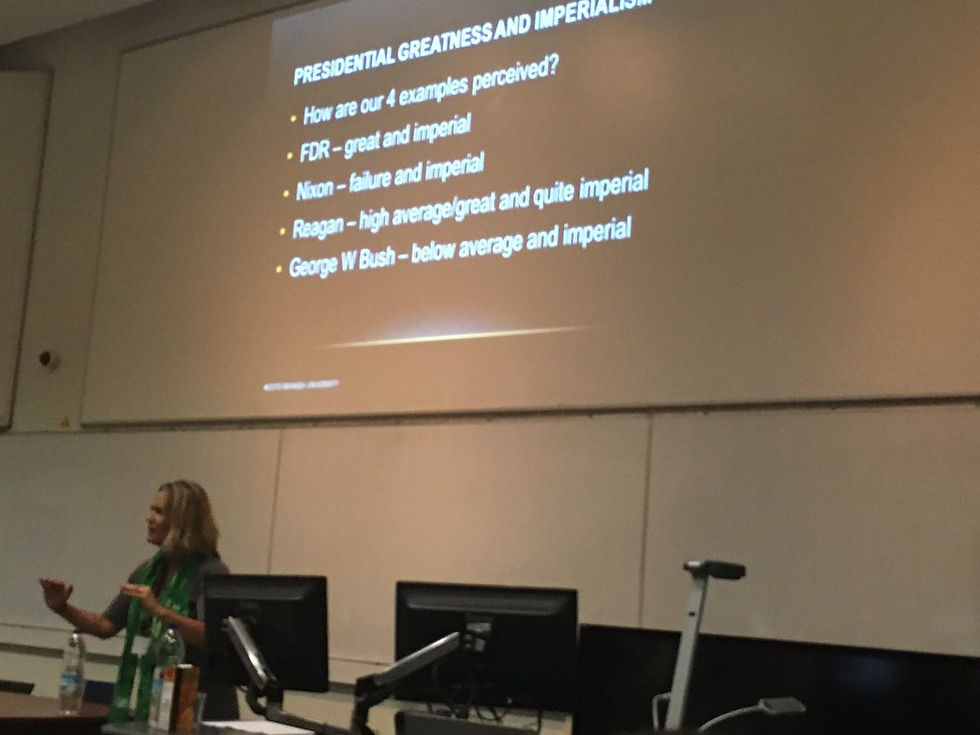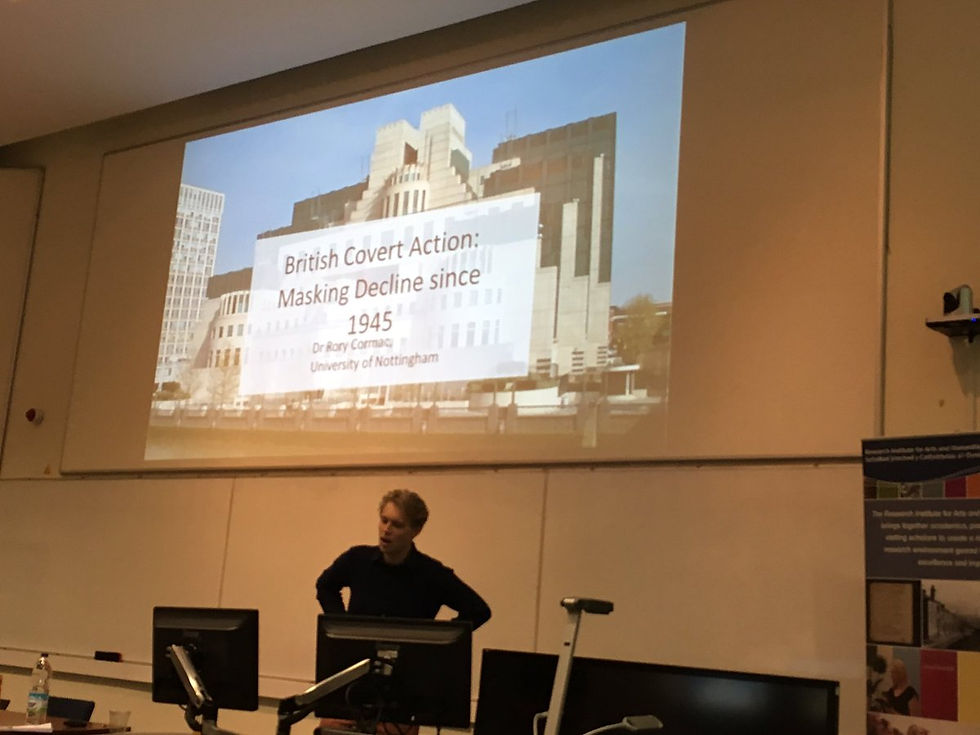Out of the Shadows Conference 2017
- Luca Trenta
- Sep 17, 2017
- 4 min read
What does it mean for a Presidency to be 'Imperial'? Who were the 'Imperial' presidents? How do presidents make decisions in foreign policy? And what happens when those decisions turn into failure, like the Bay of Pigs invasion? How influential have the CIA and conspiracy theories surrounding the agency been in American history? Did they play a role in electing Donald Trump? What drives Russia's foreign policy? Why and how have the British Secret Services engaged in covert action? How can we understand electoral interference?
With the support of the British Academy and the Research Institutes for the Arts and Humanities (RIAH), on Friday the 15th of September 2017, we hosted our first Out of the Shadows Conference at Swansea University. The event addresses these and many other questions. The all-day event featured academics, teachers and approximately 100 pupils from England and Wales.

Dr Clodagh Harrington (DeMontfort University) started the event with the first keynote. Starting with Arthur Schlesinger's book, the talk discussed the Imperial Presidency, which features prominently in schools' curricula. With the help of the students, the talk identified what qualities make a good president and what it means for a president to be 'Imperial.' Providing a historical overview, the talk focused on some 'usual suspects' in the Imperial Presidency debate: FDR, Nixon, Reagan and George W. Bush. Probing questions from the students asked whether academics should suspend personal judgment in assessing Presidents and whether Donald Trump is moving towards an Imperial Presidency.
In the first panel, Allyson Edwards (PhD candidate at Swansea University) discussed Russia's foreign policy since the end of the Cold War. The talk provided some much needed context to the current debates on Russia and Russia's foreign interventions and interference in elections. Based on original fieldwork, the talk highlighted the prominent role of the military and of everyday militarism in Russia's society. Francesca Akhtar (PhD candidate at UCL) moved the focus back to the United States and to presidential power. Through an analysis of the Bay of Pigs, the talk described the manifold of pressures on President Kennedy in the run-up to the invasion.
During the lunch break, academics had an opportunity to discuss with teachers the topics they address in their classes. Schools showed an interest in talks and seminars on the Cold War, US and UK politics, as well as the evolution of warfare. Several schools also showed an interest in future one-day events, as well as CPD training for teachers.

After lunch, Dr Rory Cormac (University of Nottingham) provided a detailed and fast-paced history of MI6 and of British involvement in covert action - from Italy and Albania in the early Cold War, to Afghanistan in the 1980s. The talk addressed the important role played by covert action in maintaining the UK's global position and in masking decline. The students engaged in a lively discussion regarding the necessity of covert action as well as the role of transparency in government. Can a democracy survive in secrecy? Is the exposure of these secrets a form of treason? The students were divided.
Secrets and conspiracies also characterised the talk of Dr Simon Willmetts (University of Hull). The talk delineated the rapid decline of the US people's trust in government. The Kennedy assassination, Watergate, the CIA's 'family jewels,' and Iran-contra contributed to the development of a climate of mistrust and to the flourishing of conspiracy theories. It was this climate that made it possible for Donald Trump, conspiracy theorist in Chief, to get elected.
The last talk of the day, by Dr Luca Trenta (Swansea University), started with the recent controversy regarding Russia's interference in the 2016 US Presidential elections. Providing context and a historical background to current events, the talk explored the Italian elections in 1948. To what extent did the US try to influence the elections in favour of the Christian Democrats? What strategies did the US use? How involved was the CIA? The talk also provided students with the information needed for the final session of the day: the 1948 Italian elections role play.
For the final session, students were divided in small groups. In a seminar setting, PhD students run a role play session. Students were asked to 'play' key roles in the 1948 Italian elections. Some students impersonated key decision-makers in the US, Italy and the Soviet Union. These included Harry Truman, Alcide De Gasperi (leader of the Christian Democrats) and Palmiro Togliatti (leader of the Popular Democratic Front). Other were asked to take the place of Italian voters and to identify grievances and concerns in the Italy of 1948; a country just emerged from one of the most violent campaigns of World War II. Decision-makers had to identify what strategies to adopt to guarantee the victory of their local proxies. In some groups, the competition was gentlemanly, in others bribery, corruption, assassination attempts and other dirty tricks were considered. In all, the elections were conducted in an orderly manner with no effort to 'stuff' the ballot boxes. The students enjoyed the role play and the elections. Overall, the event proved successful (we will soon provide students' feedback from the day). The exciting and often controversial nature of the topics discussed guaranteed that the students remained engaged throughout the day.




Comments